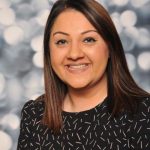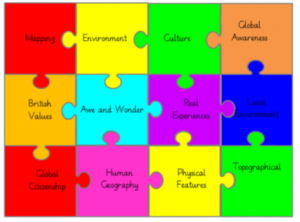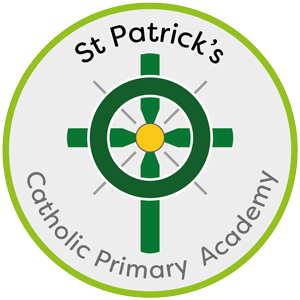Latest News
Geography at St. Patrick’s
Subject Leader – Miss Devi & Mrs Connor
 Intent
Intent
At St Patrick’s School the geography curriculum teaches an understanding of places and environments. Through their learning in geography, children will explore their local area and compare their life in this area with that in other regions in the United Kingdom and in the rest of the world. Our intent is that the geography curriculum will enable the children to have first-hand experiences of the world, to learn how to draw and interpret maps, develop the skills of research, investigation, analysis and problem-solving. Through their growing knowledge and understanding of human geography, children will gain an appreciation of life in other cultures. Geography teaching also motivates children to find out about the physical world, the importance of sustainable development and promote key British Values.
Our Geography curriculum is designed to allow each pupil to:

Our Geography curriculum is designed so that each pupil:-
- Achieves the best possible academic standards in Geography regardless of starting point or ability.
- Experiences and explores human and physical geographical features in a real life context.
- Understands their role in the sustainability of the world and global citizenship.
- Develops an awareness of other cultures and, in so doing, achieves respect, tolerance and understanding of what it means to be a positive citizen in a multi-cultural country; embedding fundamental British values.
In Geography, we aim to provide an opportunity to develop interests and overcome barriers through our ‘Curriculum Drivers’. These drivers are used to underpin the direction and development of our curriculum and to ensure that Geography is enriched and personalised in order to meet the needs, interests and ambitions of our children and families. We want our children to be:-
- Aware of their ‘community’, giving opportunities to understand how their community differs from others.
- Children will work together to share findings using oracy, literacy, mathematics and graph skills as ‘communication’ using subject-specific vocabulary
- Avid learners can actively gain knowledge of the ‘wider world’ beyond their own community and how behaviour of all living organisms impacts on our world.
- Children will use their natural curiosity and engage in rich experiences that provide ‘possibilities’ to use their imagination, become increasingly ambitious, think critically and solve problems
- Children will have opportunities to learn outdoors and experience being outside, this is good for both mind and body and encourages ‘healthy lifestyles. Children will have opportunities to find out about how a geographic area can impact on the lifestyles of the people living there and develop an understanding on how local resources influences the overall health and nutrition of a population.
Implementation
St Patrick’s school is committed to meeting the requirements and attainment targets of the primary National Curriculum for Geography we use our unique Curriculum Drivers to guide our curriculum.
Our curriculum enables teachers to use a variety of teaching methods and learning styles within lessons. The curriculum is planned and taught taking into consideration the needs of all pupils based on their relative starting points. Geography teaching will be exciting and engaging with opportunities for children to participate in a range of real-life experiences such as climbing the Wrekin, a local hill based in Telford, exploring a contrasting location to broaden their geographical knowledge and understanding and taking part in orienteering at the Pioneer Centre.
Children are provided with enquiry-based research learning opportunities and we encourage children to ask as well as answer geographical questions. We offer them the opportunity to use a variety of data, such as maps, globes, statistics, graphs, pictures, and aerial photographs, and we enable them to use computing and digital technologies to enhance their learning. Children take part in role-play and discussions, and they present reports to the rest of the class. They engage in a wide variety of problem-solving learning. Wherever possible, we involve the children in ‘real’ geographical opportunities, e.g. research of a local environmental problem or use of the Internet to investigate a current issue.
Organisation and Planning
We have developed and reviewed our scheme for geography and use Plan Bee as the basis for our curriculum planning. We used the National Curriculum and our Curriculum Drivers to support our decisions when planning the topics for each year group, we make use of the local environment in our fieldwork and we also choose a locality where the human activities and physical features provide a contrast to those that predominate in our own immediate area before investigating national and global physical and human features. We review our long term plan on an annual basis.
Our curriculum planning is in three phases. Our long-term plan, maps the geography topics studied in each term during each key stage. The geography subject leader works this out in conjunction with the senior leadership team and teaching colleagues in each year group.
As the basis for our medium-term plans, we use detailed Knowledge Organisers for each half term. These set out; key knowledge to be taught, key vocabulary reflecting progression throughout the year groups, national curriculum links, enrichment activities, facts and questioning, along with unit markers that will aid assessment. The Knowledge Organisers are displayed in each classroom and are sent home each term informing parents of the current geography focus.
The geography subject leader reviews these plans on a regular basis ensuring key skills are being taught and learning objectives are being covered, in relation to a child’s age-related expectations and the interest and needs of our pupils.
Our short-term plans are in the form of notebook slides and incorporate the Plan Bee scheme. Each lesson will list the specific learning objectives with differentiated success criteria and identify the resources and learning opportunities that will be used in each lesson.
In the Foundation Stage we teach Geography through the area of Knowledge and Understanding of the World as an integral part of our topic work covered throughout the year, focusing on; People, Cultures and Communities and The Natural World. Geography makes a significant contribution to the objectives of developing a child’s knowledge and understanding of the world through activities such as collecting postcards from different places, singing songs from around the world, or investigating the seasons and weather
At Key Stage 1 and 2 the geography curriculum enables children to achieve the objectives set out in our intent. To support children in reaching their full potential learning is linked cross curricular. To support the development of key English skills children, record key information, write reports and letters and take part in debates where they discuss their geographical thoughts and opinions. At St Patrick’s children study various parts of the world, including; the United Kingdom, North and South America, India and Scandinavia. We look at the physical geography of rivers, mountains, volcanoes, earthquakes and the water cycle. Our human geography looks at types of settlement, land use, economic activity and the distribution of natural resources
Children use computing in geography to enhance their skills in data handling and in presenting learning, they also use it as a research tool to gather information.
Geography lends itself to raising matters of citizenship and social welfare. Children study contrasting locations, the way people live and how environments are different and are changed for better or for worse. Geography at St Patrick’s promotes the concept of positive citizenship, promoting British values through respect and tolerance of others and their differences.
We encourage children to reflect on the impact of mankind on our world and what it means to be a responsible citizen. Through teaching about contrasting localities, we enable the children to learn about inequality and injustice in the world. We help children to develop their knowledge and understanding of different cultures so that they learn to avoid stereotyping other people and acquire a positive attitude towards others. We help contribute to the children’s social development by teaching them about how society works to resolve difficult issues of economic development as well as moral ethos.
Where children are to participate in learning opportunities outside the classroom, for example, a field trip, we carry out a risk assessment prior to the activity, to ensure that the activity is safe and appropriate for all pupils and their learning needs.
In Geography we believe the children at St Patrick’s are entitled to a world class curriculum which enables them to;
- Undertake fieldwork and gain first-hand experience where possible
- gain a knowledge and understanding of places in the world;
- develop an awareness of other cultures and, in so doing, achieves respect, tolerance and understanding of what it means to be a positive citizen in a multi-cultural country; embedding fundamental British values
- learn graphic skills, including how to use, draw and interpret maps;
- understand environmental problems at a local, regional and global level;
- be encouraged to think ethically about the sustainability of the world
- understand and appreciate global citizenships;
- develop skills of enquiry, problem solving, ICT, investigation and presentation.
- have access to a range of resources including maps, atlases, globes, textbooks and educational software.
Impact
At St Patrick’s Catholic School, through our curriculum we are enabling children to gain a broad and balanced understanding of the key geographical skills and knowledge of their local, regional and global environments. The curriculum supports children in developing their understanding of both the physical and human geography around the world.
The curriculum design and planning will lead to outstanding progress for all pupils, regardless of their starting points, over time. Learning is progressive and builds on prior knowledge and understanding and supports children in producing outcomes of the highest quality.
Teaching and learning is adapted to cater for the needs of all pupils; providing support for children with special educational needs and enrichment and challenge for more able children.
The geography subject leader is responsible for regularly monitoring and reviewing the curriculum, the standard of the children’s work and the quality of teaching in geography. The geography subject leader is also responsible for supporting colleagues in the planning and teaching of geography, informing others about current developments in the subject, and for providing a strategic lead and direction for the subject in the school.
Time is allocated for reviewing samples of children’s work and for visiting classes to observe teaching in the subject. Feedback will be given around what is going well and what are the ways to grow.
Our assessment system will be used by the children and staff to reflect on the progress that is being made over time in Geography. Assessment is made using termly unit markers for each topic, observations of learning, written and non-recorded outcomes, marking and day to day assessments. The Geography leader will evaluate progress that has been made and the impact of the curriculum to ensure all pupils have been taught the knowledge and skills they need to deepen their geographical understanding.
Evidence will be gathered in the form of a big book to show a ‘snapshot’ of Geography at St Patrick’s, incorporated in this will be a large focus on Pupil Voice. Pupil Voice will be used as an evaluation tool to develop the future teaching and learning of Geography.
Geography Documents
Please view the additional documents in school:
- Geography Knowledge and Skills Progression
- Geography Vocabulary Progression
- Geography Unit Markers
- Geography Knowledge Organisers

